Learn Across Borders is a Florida USA, non-profit Corporation dedicated to human learning and empowerment, exempt from USA Federal Income Tax under section 501 ( c ) (3)of the Internal Revenue Code.
Access to knowledge is the right of every human being, and participation in its generation, application and diffusion a responsibility that all must shoulder in the great enterprise of building a prosperous world civilization-each individual according to his or her talents and abilities. More » « Less
We aim to enhance human prosperity, promote the well-being of the people and empower them by facilitating access to education specifically for populations otherwise denied.
We believe that the denial of education can take place due to differences in race, color, gender, language, religion, nationality, origin, economic and social status, and minority and indigenous identity. Such populations, denied of education, are the primary beneficiaries of our services.
Social change is not a project that one group of people carries out for the benefit of another, nor development is conceived as a package to be handed to the local population. Success in the development field will depend largely on natural stirrings at the grass roots, and should receive its driving force from those sources rather than from imposition of plans and programs from the top. Justice demands universal participation. We perceive the masses of humanity as resources rather than problems. Human being is, indeed a mine rich in gems of inestimable value, however its inherent potentialities only become manifest through proper education. Access to knowledge and appropriate education would allow people be transformed from beneficiaries of projects to true protagonists of development.
While development efforts often begin by offering basic services to a population, they cannot be sustained unless people themselves are empowered to arise and participate in these very efforts. These efforts should begin simply, at the level that can be sustained by the local population. The scope and complexity of social action must be commensurate with the human resources available in a village or neighborhood to carry it forward. Therefore a certain degree of capacity must necessarily build at the local level to undertake development efforts and to benefit from outside technical and financial assistance. To build the required capacities appropriate training programs should seek to imbue participants with a sense of purpose and develop in them a number of capabilities-endowing them with the understanding of concepts, knowledge of facts, and mastery of methods, as well as the skills, attitudes, and qualities needed to lead a productive life. This calls for a new kind of education, with a new content, new methods, and new institutions, which would train people to become effective agents capable of generating well being for themselves and their communities. Service to the community is the taxis around which this new education system is build.
The purpose of development is the well-being of the people. The concept of well-being is understood in its broadest sense to refer to material, intellectual, social, and spiritual fulfillment. While material wellbeing and economic growth is clearly an objective, it should be perused in light of recognition that true prosperity is equally contingent on spiritual progress. Spirituality is a state, an inner condition that should manifest itself into action, in everyday choices, in profound understanding of human nature, and in meaningful contribution to community life and society. All people not only have the right to benefit from a materially and spiritually prosperous society but also have the obligation to participate in its construction.
Development plans have to pay attention to the strengthening of organizational structures. Institutional capacity at local and regional level is a requirement for sustainable projects and plans. Without institutional capacity the collective desire to take some form of social action will not necessarily be translated into sustainable development projects. Institutions are required at all levels of society to act as chandelles through which the talents and energies of individuals and groups can be expresses in service to humanity. Development will therefore be assessed in terms of the increasing the capacities of both people and their institutions to address the spiritual and material needs and aspirations of the populations they serve.
(The teachings of the Baha’i Faith have been the source of inspiration for selecting these principles which are taken and adapted from documents published by Baha’i authors and institutions.) « Less
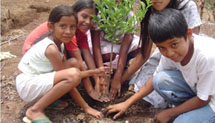
We participate in training volunteers to work with capacity building and moral education programs for children and youth.
Learn More »
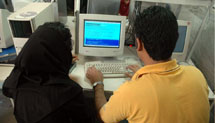
LAB works with the Bahai Institute for Higher Education to provide higher education for deprived youth in Iran.
Learn More »
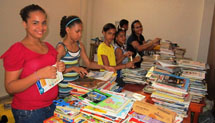
We are currently working with community libraries in the Dominican Republic, Haiti and Panama
Learn More »
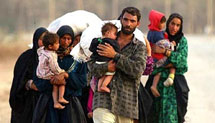
We work with refugees providing translation and communication services, advice, and moral support.
Learn More »
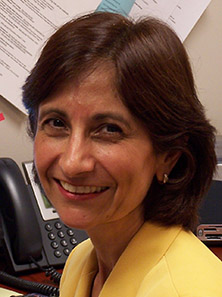
Behnaz Rouhani earned her B.S. in Mathematics from Hertfordshire University in United Kingdom, M.A in Economics from West Virginia University, M.A. in Mathematics and PhD in Mathematics Education from the University of Georgia. She is currently an associate Professor of Mathematics at the Online Campus of the Georgia Perimeter College.
She has been teaching Online Mathematics and Mathematics education courses using different platforms since 1999. In addition, she has been collaborating with Baha’i Institute for Higher Education (BIHE) as a mathematics faculty and administrator for the past eight years. Prior to teaching she worked in the private industry as a Research Analyst.
Behnaz has written two study guides and a self-help book for students on how to be successful in their mathematics journey. She has presented at various international, national, regional and local professional conferences.
She is a recipient of the Commissioner's Award of Excellence at Athens Technical College, and Exemplary Professor Award at Georgia Perimeter College. Behnaz was Governor’s Teaching Fellow during 2011. She is currently chair of the Placement and Assessment Committee of the American Mathematical Association of the Two-Year Colleges (AMATYC).
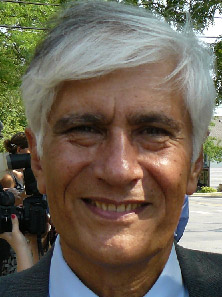
Allen Amrollah Hemmat received a B.S. degree with a major in Physics from the Pahlavi University. Following his undergraduate work, Hemmat attended the prestigious Iran Center for Management Studies, an international school taught in collaboration with Harvard University where he received his Masters of Business Administration. Subsequently he received an MS degree in Applied Behavioral Science from Johns Hopkins University and a Ph.D. in Communication from the University of South Florida.
Hemmat is an expert in cross-cultural communication, the coauthor of four volumes of poetry translated from Persian and Arabic into English, and books and educational material on Arabic grammar and translation studies. In addition to his literary work, Hemmat has conducted research for the National Aeronautics and Space Administration (NASA), invented and patented telecommunication technologies, has published articles, and delivered presentations at national and international conferences. His business experience includes large scale program and product management (10-100 million dollars) with large US corporations.